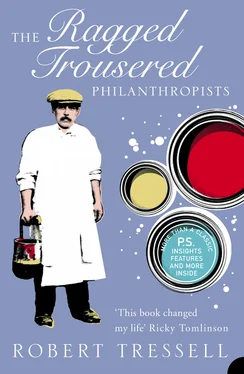The Ragged Trousered Philanthropists brims with ideas. Although written in the first decade of the twentieth century much of it still applies today. The economic revolution of the 1980s has led to an increase in poverty and greater job insecurity. There is fierce debate about whether ‘popular’ culture is a distraction from the ‘real’ problems or whether it can be a source of opposition to the dominant meanings in our society. Similarly, discussion rages over whether ‘high’ culture is elitist, or whether it answers the need for a felt depth in experience which is not catered for by the institutions of post-industrial capitalism. Tressell’s novel has much to say about all these issues. It portrays, in unremitting detail, the crushing despair of poverty, the brutality of labour relations and the blighting of hope. Its solution is socialism. But, like many of the ideas in the novel, socialism receives contradictory treatment and its relation to ‘high’ culture is certainly problematic.
The problems of the book should not be allowed to detract from its achievement of marrying art and politics in the English novel. Traditionally, these have been kept apart; art invites contemplation, politics action. This obscures the relation between them. Both evaluate life and, in finding it wanting, endeavour to endow it with significance. Socialism, wrote Arnold Wesker, ‘isn’t about talking all the time, it’s living, it’s singing, it’s dancing, it’s being interested in what [is] go[ing] on around you, it’s being concerned about people and the world.’ 14
Properly understood, politics makes good the promise of art. To this end The Ragged Trousered Philanthropists issues an emphatic challenge: ‘Every man who is not helping to bring about a better state of affairs for the future is helping to perpetuate the present misery and is therefore the enemy of his own children’ (pp.131-132). Such forthrightness cannot be ignored. It demands we learn more about the world, examine our consciences and evaluate our habits. It also demands we recognise the extent of our obligations and responsibilities, and then act accordingly. The novel, in short, invites us to live, in the largest sense of that word.
GARY DAY
November 1996
In writing this book my intention was to present, in the form of an interesting story, a faithful picture of working-class life – more especially of those engaged in the Building trades – in a small town in the south of England.
I wished to describe the relations existing between the workmen and their employers, the attitude and feelings of these two classes towards each other; the condition of the workers during the different seasons of the year, their circumstances when at work and when out of employment: their pleasures, their intellectual outlook, their religious and political opinions and ideals.
The action of the story covers a period of only a little over twelve months, but in order that the picture might be complete it was necessary to describe how the workers are circumstanced at all periods of their lives, from the cradle to the grave. Therefore the characters include women and children, a young boy – the apprentice – some improvers, journeymen in the prime of life, and worn-out old men.
I designed to show the conditions resulting from poverty and unemployment: to expose the futility of the measures taken to deal with them and to indicate what I believe to be the only real remedy, namely – Socialism. I intended to explain what Socialists understand by the word ‘Poverty’: to define the Socialist theory of the causes of poverty, and to explain how Socialists propose to abolish poverty.
It may be objected that, considering the number of books dealing with these subjects already existing, such a work as this was uncalled for. The answer is that not only are the majority of people opposed to Socialism, but a very brief conversation with an average anti-socialist is sufficient to show that he does not know what Socialism means. The same is true of all the anti-socialist writers and the ‘great statesmen’ who make anti-socialist speeches: unless we believe that they are all deliberate liars and imposters, who to serve their own interests labour to mislead other people, we must conclude that they do not understand Socialism. There is no other possible explanation of the extraordinary things they write and say. The thing they cry out against is not Socialism but a phantom of their own imagining.
Another answer is that ‘The Philanthropists’ is not a treatise or essay, but a novel. My main object was to write a readable story full of human interest and based on the happenings of everyday life, the subject of Socialism being treated incidentally.
This was the task I set myself. To what extent I have succeeded is for others to say; but whatever their verdict, the work possesses at least one merit – that of being true. I have invented nothing. There are no scenes or incidents in the story that I have not either witnessed myself or had conclusive evidence of. As far as I dared I let the characters express themselves in their own sort of language and consequently some passages may be considered objectionable. At the same time I believe that – because it is true – the book is not without its humorous side.
The scenes and characters are typical of every town in the South of England and they will be readily recognized by those concerned. If the book is published I think it will appeal to a very large number of readers. Because it is true it will probably be denounced as a libel on the working classes and their employers, and upon the religious-professing section of the community. But I believe it will be acknowledged as true by most of those who are compelled to spend their lives amid the surroundings it describes, and it will be evident that no attack is made upon sincere religion.
1 An Imperial Banquet. A Philosophical Discussion. The Mysterious Stranger. Britons Never shall be Slaves
The house was named ‘The Cave’. It was a large old-fashioned three-storied building standing in about an acre of ground, and situated about a mile outside the town of Mugsborough. It stood back nearly two hundred yards from the main road and was reached by means of a by-road or lane, on each side of which was a hedge formed of hawthorn trees and blackberry bushes. This house had been unoccupied for many years and it was now being altered and renovated for its new owner by the firm of Rushton & Co., Builders and Decorators.
There were, altogether, about twenty-five men working there, carpenters, plumbers, plasterers, bricklayers and painters, besides several unskilled labourers. New floors were being put in where the old ones were decayed, and upstairs two of the rooms were being made into one by demolishing the parting wall and substituting an iron girder. Some of the window frames and sashes were so rotten that they were being replaced. Some of the ceilings and walls were so cracked and broken that they had to be replastered. Openings were being cut through walls and doors were being put where no doors had ever been before. Old broken chimney pots were being taken down and new ones were being taken up and fixed in their places. All the old whitewash had to be washed off the ceilings and all the old paper had to be scraped off the walls preparatory to the house being repainted and decorated. The air was full of the sounds of hammering and sawing, the ringing of trowels, the rattle of pails, the splashing of water brushes, and the scraping of the stripping knives used by those who were removing the old wallpaper. Besides being full of these sounds the air was heavily laden with dust and disease germs, powdered mortar, lime, plaster, and the dirt that had been accumulating within the old house for years. In brief, those employed there might be said to be living in a Tariff Reform Paradise – they had Plenty of Work.
Читать дальше












